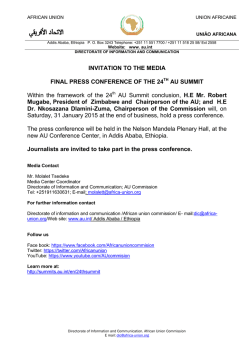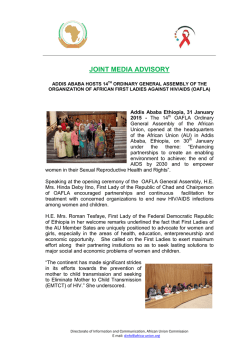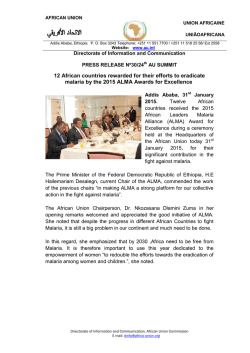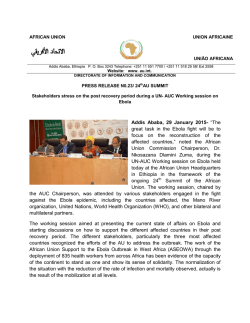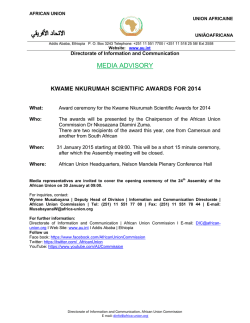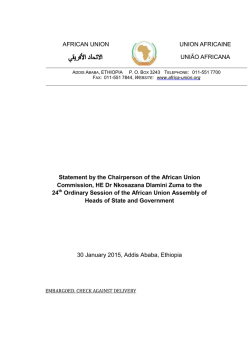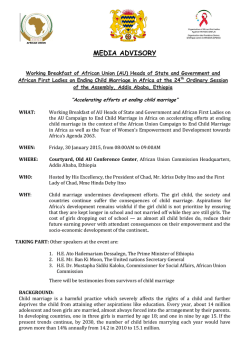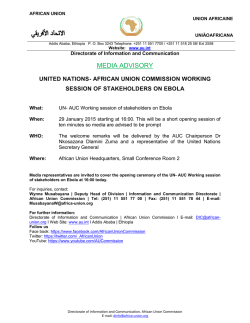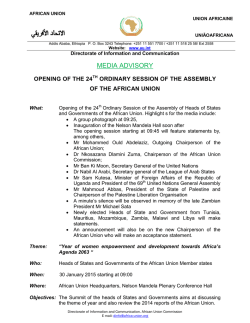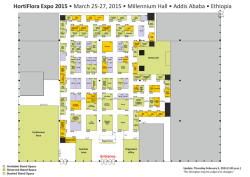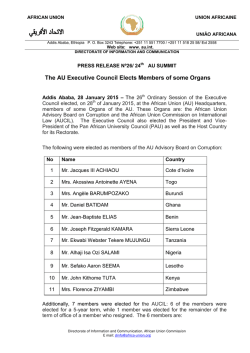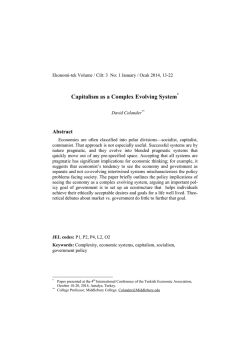
Inaugural lecture at the launching of the Meles Zenawi Foundation
"Meles Zenawi and economic transformation in Africa" Inaugural lecture at the launching of the Meles Zenawi Foundation Donald Kaberuka, President African Development Bank Addis Ababa, Ethiopia January 29, 2015 1 Thank you. Good afternoon to you all. We are here today to celebrate an Ethiopian patriot, a great son of Africa and a distinguished citizen of the world, truly one of Africa’s post-independence political giants. I have chosen as inspiration to my lecture today a quote from Einstein which the late PM Meles Zenawi liked to cite in regard to economic policy in Africa. That is: Insanity has a technical definition – “doing the same thing all over and each time expecting a different outcome.” His firm conviction was that African economic policies over several decades fitted in this category. But let me first warmly congratulate the trustees of the Meles Zenawi Foundation for the initiative and for the kind invitation. I want to thank the family, friends, invited guests, colleagues of our late Leader here today. When the trustees of the Foundation approached me to do this inaugural lecture, I was at once enthusiastic, but at the same time not sure that I was the best person to do so. I thought there were many other people, here in Ethiopia, in Africa and indeed all over the World who were best qualified to do so. I could certainly think of many eminent personalities, who I hope in months and years to come will speak at this Foundation on the many issues in which Meles Zenawi left a big legacy. Over the years I had the honour of getting to know PM Meles Zenawi, through my responsibilities as President of the African Development Bank. 2 Ethiopia, as some of you might know, is one of the two largest partners of the Bank, on the concessional window. So I was a frequent visitor to Ethiopia visiting our projects, discussing policy with the authorities. In so doing, I had the privilege of extensive discussions with him on Ethiopia’s economic policies and African development issues at large. Alongside other colleagues, I worked closely with the late PM on issues related to the G20, NEPAD and climate change of which he was Africa's spokesperson. I learnt much from him. He was one individual you could never cease to learn from, no matter how frequent your interaction. I am therefore truly very humbled to be asked to give this inaugural lecture. 3 Excellencies, Dear Friends Today Ethiopia, like many African countries, still faces many socio economic challenges. But Ethiopia is one of the fastest growing economies in Africa, and had done so for years. It is not only a fast growing economy, it is also undergoing a significant transformation. Invited recently to speak to staff and Faculty of Fletcher School at Tufts University in Boston, I was challenged on this narrative which some have labelled "Africa Rising." Was it not a mere function of global commodity prices? I was asked. And by deduction, did it not follow then, that as the commodity supercycle comes to an end, African would return to the low or negative growth path of yesteryears? My response was this: Like the "Africa rising cliché" itself, this conclusion was too simplistic. I advised we turn to evidence; I cited the case of Ethiopia or my own country Rwanda, both of which have experienced strong, rapid, sustained growth, lifting millions out of poverty in record time, and yet are not endowed with vast underground wealth. In contrast, compare that with many countries where growth is largely commodity driven, such as oil and gas In such cases, usually, while growth is strong, it is also very volatile. In addition, its poverty reducing elasticity quite low. 4 In countries like Ethiopia, one has to look to other explanatory variables beyond commodities, including very high rates of investment, increased agricultural productivity, a rapidly expanding services sector, etc. Your Excellencies, Dear friends, No keen observer of Ethiopia over the years, not even Meles’ critics, of which there were many, would deny that the country has changed dramatically in the last decade and a half. Was it a miracle? Unlikely. Miracles do not happen in development So how did it happen? Let me step back fifty years ago, when the founding fathers, the independence generation brought colonialism to an end. They had fought for and won the right of Africa to self-determination. This battle was to go on for years until Southern Africa was free during the 1970s and the 1980s. In fact, it was only fully won when Nelson Mandela and his colleagues brought down apartheid in 1994. But another epic struggle awaited the founding fathers. 5 The socio economic transformation of the Continent. That marathon run still goes on today. At times, it has been a battle of wits, trial and error, stop and go, all types of tribulations. There have been moments of despair. A combination of policy errors, instability, rapid population growth, the geopolitics of the Cold War and its ramifications in the African theatre. Remember the "lost decade", "Afropessimism" and much more? This is the fight Meles joined once he and his comrades assumed the reins of power in 1991. He took on that battle with a characteristic combination of strong will, fine intellect, unique analytical skills, and a deep reading of how nations fail or succeed. A firm believer that emancipation begins in the mind, he set about taking a clinicians look at the prevailing economic paradigm in Africa. He concluded: This is a paradigm which was leading to nowhere. He summed up his thinking in his widely discussed paper, "Dead Ends, New Beginnings". To appreciate Meles Zenawi’s outlook one has to step back in the early post-independence era. "The rent seeking state" For the first two decades of independence, the dominant ideas in economic development were centered around the need to correct for market failure, fill the void of an embryonic private 6 sector, for the new States to assert their role in the economy. This was the wisdom of the time. The result was extensive active intervention of the state in the economy, import substituting industrialisation and significant market repression. The result was mixed. To be fair, there were some social and economic gains. In some countries even a nascent manufacturing sector of mainly consumer goods began to develop. Even though, the benefits of punitively high tariff barriers were however mainly captured by the elites. On the back of this State dominated economy, there developed a parasitic, predatory, rent seeking elite; presiding over a society characterised by gross inequalities, slow growth, corruption and limited ability to create sustainable value . In Swahili the general populace cynically called the system "matunda ya Uhuru" (the fruits of independence). In its most obnoxious and primitive form, as in Idi Amin’s Uganda, the rent seekers were called "mafuta mingi", meaning lots of fat. In due course the policies were discredited even further, by confiscation policies such as the "Zairianisation" in the then Zaire (now DRC) Overall, a state-dominated economy was a monumental failure. 7 Inevitably there followed years of frustrations with the "commanding role "of the State in the economy, cyclical macroeconomic crises, underperformance, leading to social frustrations Incidentally, it is important to note how these frustrations often fed into instability as different rent seeking groups (to use Meles’ dictum) fought for control via cycles of military putsches, with each group claiming to be the new saviours. "The neo liberal paradigm" A counter revolution was waiting in the wings. In 1980, the World Bank published a report euphemistically titled "Accelerated development in Africa". Its conclusions quickly grew in influence and became a primer in how Development Economics was taught. I was a young graduate student and I can recall long nights trying to absorb it all on this new highway to Damascus! Drawing its source from Milton Friedman and the Chicago school, a new paradigm emerged. It made a simple, not to say, a simplistic case, that all that was needed, was the neoliberal model of free markets and a minimal state. Africa’s problems were said to be too much state. Therefore the solution was: get the State out and let free markets flourish. 8 One has to recall too that those were the years of the Thatcherite and Reaganite “revolutions”. With so many African countries economic policy thinking largely externally shaped, it was not surprising that the so called Washington Consensus became the doctrine of the day. Full blooded structural adjustment was born. There followed a decade of privatization, liberalisation, dismantling of the role of the State in the economy. Let me be clear: in certain cases, there was indeed a case for macroeconomic correction and policy reforms. The State, in many countries, had gone too far. Policies of administrative fiat and controls were causing extensive damage to the economic apparatus. Take the case of currencies. Foreign exchange controls, overvalued currencies, extensive price controls, were a source of massive rent for the elite, subsidizing their unsustainable consumption patterns. These same policies were overtaxing and squeezing the farmers and penalizing exports. Far from being “unintended consequencies”, these were policies working in favour of the elites. By the mid-1980s, macro-economic reforms had become an imperative everywhere. The fact that this was one of the elements in the policies of the Washington Consensus does not nullify their importance at that time. 9 Fast forward: By the mid-1990s, this neoliberal construct began to show its own internal contradictions and incoherences. Failure to appreciate that, even in the most neo liberal dispensation, the private sector needs a strong state was naivety writ large. Introduction of "cost recovery” in health and education, rejection of even minimal targeted social safety nets, as a necessity in any society (till very much later) undermined the social cohesion needed for reforms. In his writings, the late PM Zenawi concluded this way: while this model could correct macroeconomic distortions, it would never generate the kind of transformation Africa needed. So here was the conundrum. On one hand, the State-led model had showed its negative impact and limitations. On the other hand, the neoliberal doctrine had come against the walls of its internal contradictions. It was time for a fresh thinking. PM Meles led the charge. In his own dictum, we had come to dead ends and we needed new beginnings. But here is something for us to ponder: The late PM was not the first person to reject the Washington Consensus, its critics were 10 legend. Neither was he was the first to demonstrate the failure of the Statist model of the 1960s. Many experts before him had done so. Here was the difference. While the late PM accepted the importance of markets in allocating resources, he rejected market fundamentalism outright. While he asserted the central role for the State, he rejected a predatory, parasitic state controlled by rent seekers It had to be a qualitatively different State. One which creates value. A State that simultaneously takes on market failure and rent seeking. He set about crafting and defining its characteristics, its mission, its boundaries, its attributes. I claim not to have a complete command of what he fully had in mind, and in fact, even for him, this was very much work in progress. But I surmise that the premises were the following: First: Throughout human history transformation in its early phases has been led and driven by the State . 11 It is disingenuous to believe that at this stage of development African countries economic policies should resemble those of rich nations today. Second: It is not simply that private sector lacks the means or risk appetite for the key investments for transformation; it is rather that the vision for such a transformation, its form and direction, implies the right State that shows the way. Taking rent and transforming it into long term value, in infrastructure, agriculture, in key domains of industry. Making selective use of incentives and disincentives to guide private-sector investments. Taking advantage of any leapfrogging possibilities, and not always reinventing the wheel. Only such a State that is not a “night watchman” had the seeds to take the country from low productivity, low technology trap to higher levels of the global value chains. This was the philosophy of what is known as the "Developmental State", whose fuller definition and implications for Africa Meles Zenawi was still working on. 12 But something else is important here: the late PM did not stop at the level of the philosopher King. He did not stop at “ex Cathedra” positions. He put the theory into practice, to allow practice to feed theory. Like Deng Xiaoping, and the early economic zones in Southern China, he sought to learn from practice, through The Growth and Transformation Plan. It worked. It is not waterproof. There are things that some of us outsiders need to better understand, things that one might do differently. In any case, a good plan is a dynamic, living document requiring regular review against the economic environment and the evidence. But the GTP is working, and delivering results. The author Charles Kettering famously said that "People are very open minded about new things as long as they are exactly like the old ones!" Meles rejected old wines in new bottles. He opted for a totally different product. 13 Giving meaning to the famous cliché: "If you risk nothing then you risk everything." He understood the risk and rewards of breaking with the past. Like John Cage, "he was not frightened of new ideas, rather he was frightened of the old ones". In 1991, Ethiopia was one of Africa s least developed economies, exhausted by communist ideology after decades of feudal rule. A poster child of poverty and recurrent famines. But by the time PM Meles passed away, Ethiopia was a net exporter of food. Ethiopia was already a net energy exporter, attracting massive investments and laying a basis for industrialisation. Meles had his critics, legions of them. But none of them would today deny that Ethiopia is a nation undergoing deep transformation. The late PM’s readiness to take on entrenched ideas, however powerful. His determination to build upon the country’s own experience, assessing any outside advice against that experience, not vice-versa. His stamina to see through a strategy, even if unpopular, in the short term. 14 These are all traits of a transformational leader, globally recognized as such. Your Excellencies, Ladies and Gentlemen I have been privileged to be at the helm of the African Development Bank for the last ten years. I have been a witness to a remarkable reversal in Africa’s fortunes in this decade. I have seen successes and failures. I have been witness to lost opportunities and disappointments. Meles’ legacy shows what happens when a country takes charge of its own destiny. Not a knee-jerk rejection of foreign advice, ideas or experiences. To the contrary. Some of the approaches in the Growth and Transformation Plan have features which resemble those of emerging countries in Asia. But the GTP, to my knowledge, is not a replica of any model. Remember that each Asian experience is different too. So one looks at the experience of others. One listens to external advice, which is then tested against local experience, not vice-versa. 15 Africa in 2015 Your Excellencies, Ladies and Gentlemen, At the dawn of 2015 ,the international economic landscape has still not found its equilibrium since the global financial crisis seven years ago. From commodity markets, the Eurozone, to the slowdown in the large Emerging markets. All in a vortex of geopolitical events which gets messier every day – from Ukraine, the Middle East, jihadism and its tentacles in different parts of the world . Two events have shaped the last century more than anything else I can think of in terms of economic thinking. The first was the collapse of the Berlin Wall, which ended the Communist experience. The second was the collapse of Lehman Brothers, nearly a decade later. Let me explain: With the fall of the Berlin Wall, the half a century epic combat between totalitarian ideology and the liberal dispensation came to an end . A famous author Francis Fukuyama even pronounced the denouement "the end of history". The fight between the state-controlled command economy and liberal capitalism had suddenly come to an end. 16 It was said there was a clear winner: capitalism. With hindsight, we certainly know who the loser was: communist economic ideology for sure. But, did capitalism really win, and if so how did victory look like? And which type of capitalism won? To find the answer, fast-forward to 2008-2009 and the collapse of Lehman Brothers. An earthquake right at the heart of capitalism on Wall Street. With the free markets ideology almost bringing the global economy to a near death experience. Staring in the face of a global financial meltdown, something had to be done. But, lo and behold, the market fundamentalists called in their "Nemesis". In what turned out to be the ultimate irony of history, the State so maligned by neo-liberal ideology had to step in to save the day. It was now the guarantor, the only bulwark against total collapse. The rest, as they say, is history. Eight years down the road, with the global economy still reeling from those events, the discussion among the cognoscenti is how can capitalism be reformed so as to restore confidence in the unfettered market ideology. 17 There is a new buzz word – "inclusive capitalism" – whatever that means. It is at this point that I return to Meles’ analysis and its relevance for Africa. Beyond the doctrinaire and ideological economics, the reality is that successful nations have always taken different paths. There is no one unique path to development. Each nation has a different endowment, history, geography, even demography. If you look around today, among the top 20 economies of the world, it is crystal clear they aimed at same destination but arrived to it via different paths. For some, neo-liberal capitalism, despite its cyclical crises, worked well, at least for a time. For others, a welfare capitalism model is what delivered the society they wanted to see. In a number of large emerging markets, an approach which some have called state capitalism is what has delivered superior results. But even among them, there are subtle or even major differences. Other countries have arrived at wherever they are, by muddling through. Briefly put, evidence abounds that while we know what can impede development, our knowledge of how development happens requires a deep level of modesty not assisted by a fundamentalist approach to complex political economy issues. 18 At the end of the day, therefore, every nation has to ask the simple question. What is it that works for us? Markets have their place, but the idea that the State shall only be the night watchman is untenable. The rest are tactical questions which would vary from country to country: the timing, the phasing, the sequencing issues. Your Excellencies, Friends Before I conclude, let me refer to an event which took place during the WEF here in Addis? Meles was challenged by someone in the audience or the moderator, with the question: What is the link between development and democracy? If I recall his answer, it was this: Both democracy and development are ideals we must aim for. However there was no link between the two. You could agree or disagree with him, but that was his view. I know this question has always been and will ever remain controversial. But why am I referring to this? Here is the reason. 19 I have often heard the late PM’s critics posit that the Developmental State he espoused was inimical to the values of liberal democracy. If I recall his response then, it was around his strong belief that a developmental state can only succeed if it is also democratic. In contrast, he said a rent-seeking elite has no objective basis for building genuine democracy. For it is a zero sum game as to who controls the rent or, even worse, who is better at looting state resources. He added that once a developmental state succeeds it has thereby created conditions for democracy. He added though that it may often imply a longer period of stability and imperfect democracies, citing experiences as varied as Sweden or Japan after WWII, especially when facing external or existential threats. I understand this to be a very controversial and often emotive subject. I even doubt that there is a scientific answer. From where I sit, here is my take: At the end of the day, a government that is clean, that delivers for its people, that fulfils its promises, that give the citizens a voice, that is accountable to them, is what the people vote for, everywhere. As for the types of good Governments, those come in different shapes and forms, and evolve over time. 20 That is how it has always been throughout history. Meles certainly did not always get everything right. In fact, I recall a time when, in my capacity as Bank President, we agreed to disagree on a couple of issues with respect to aspects of Ethiopia’s economic policies. But I always listened carefully to his arguments, and weighed its pros and cons, as he did mine. And, at the end of the day, my standpoint was always this: He knows his country more than I do. Who am I to think I know Ethiopia better than he does? Like all great leaders, he may have made some mistakes, big and small. But that is not the issue. Conducting the affairs of State in such a complex situation is not an exact science. Consequential leaders often make big mistakes. Inconsequential leaders’ mistakes may hardly be noticed. What is important is that, in the context in which he operated, he sought to make a difference for the uplifting of his people. He was an African patriot. Whichever mission he was given by Africa – climate negotiations, 21 G20, leading on NEPAD initiatives – he discharged his duty with honour and devotion. By his force of conviction, rigour, courage, commitment, devotion to Ethiopia and Africa, he made a difference and left a solid foundation, which generations of Ethiopians and Africans to follow can build upon as a whole. So let me conclude where I started. I began paraphrasing Einstein famous quote which our late Leader liked to cite: That insanity has a technical definition: Doing the same things all over again and expecting a different outcome. By choosing a different path, here, in Ethiopia, there is a different outcome, visible to the naked eye. Ethiopia is Africa’s second most populous country. Just think: If we succeed here, the future if Africa can only be bright. However that is not pre-ordained. It requires learning from our mistakes, but also, as wisdom has it, the mistakes of others. For those of us who are Christians, The Holy Bible says, "I have fought the good fight, I have finished the race, I have kept the faith". That is exactly what our late Leader, PM Meles Zenawi, did. He fought all his life for a better Ethiopia, a better Africa and he finished his race. 22 The rest is for us and those who follow. I salute the Foundation and its Trustees for striving to keep that legacy alive. May you succeed in your noble endeavour. Thank you and God bless you all. 23
© Copyright 2026
